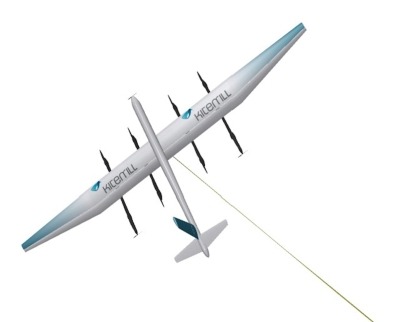
Twice the size of the KM1 prototype, with a 16-metre wingspan, it features four propellers for vertical take-off and landing. The device is capable of generating an average power cycle of 100kW.
Kitemill has spent more than a decade building world-class knowledge, IP and assets. During that time, it has helped lead and consolidate the AWE sector acquiring Kite Power Systems (KPS) and eKite while securing significant investments from En-Vision Europe Limited Ignatia and the European Innovation Council.
Its current crowdfunding initiative – accessible via Crowdcube – will support the completion of the world's first permanent test center for AWE, accelerating the development of the KM2 system.
Kitemill CEO Thomas Hårklau said its ground-breaking technology is set to feature in the €7.5m Norse Airborne Wind Energy Project (NAWEP), backed by the EU Innovation Fund, with a total of 12 KM2 units due for installation.
"Our KM2 design can propel AWE technology all the way to utility scale," he said. "We have achieved a number of significant breakthroughs in recent times, being the first firm in Europe to demonstrate automatic AWE operation in major operational phases. Our KM1 prototype has now clocked more than 500 test flights and recently set a new endurance record, covering more than 500km in five hours of continuous operation.
"We are hugely excited to enter the next phase taking our technology to commercial scale. As demonstrated by our involvement in the Norse Airborne Wind Energy Project there will be many opportunities to deploy the KM2 system over the coming years in fast-track pipeline projects around the globe."
According to a recent white paper by BVG Associates, on behalf of Airborne Wind Europe, at utility-scale generation, the AWE market could grow to around $100bn (€92.39bn) by 2035–40 and several hundreds of billions soon after. Based on the assumption that the AWE market follows the same trend as the established wind turbine market 40 years ago, BVG further estimates the cumulative global deployment of AWE could reach 5GW by 2035 and at least 177GW by 2050.
"The BVG report addresses important issues for the sector," added Hårklau. "However, estimating deployment based on wind energy's deployment history is very conservative. There is a greater urgency now, and the need for new renewables combined with increasing conflicts about area use will speed up deployment significantly once there are viable products in the market producing energy at a reasonable cost."
In the last 12 months, Kitemill's technology has secured third-party verification from Everoze and DNV. Momentum is being mirrored politically, with Norway now including airborne wind energy in the national energy research strategy.
Projections show that Kitemill's KM2 system could be scaled up further reaching a 40 m wingspan, generating 3000 kW power cycles. However, Hårklau said the KM2 design currently under development will be capable of transforming the weak grid market segment, fully demonstrating the value proposition of AWE.
"AWE offers a number of unique benefits compared to traditional wind turbines," he said. "By harvesting wind at higher altitudes, we utilize a larger air volume reducing the wake effect allowing higher energy per square kilometer. Already demonstrating access to better wind resources, we also expect to achieve a high-capacity factor of around 60%, filling the void of more intermittent renewables and bringing greater stability to the grid.
"Another huge benefit is the overall material consumption which is up to 90pc lower than conventional wind turbines regardless of scale. The flexibility of our technology also allows the system to be relocated or delivered as temporary or remote installations. In all, this makes AWE deployments highly scalable reducing the costs, materials and space required to deliver clean and reliable energy."
Kitemill's last crowdfunding campaign closed in January 2023 and was oversubscribed by NOK 1 million.

